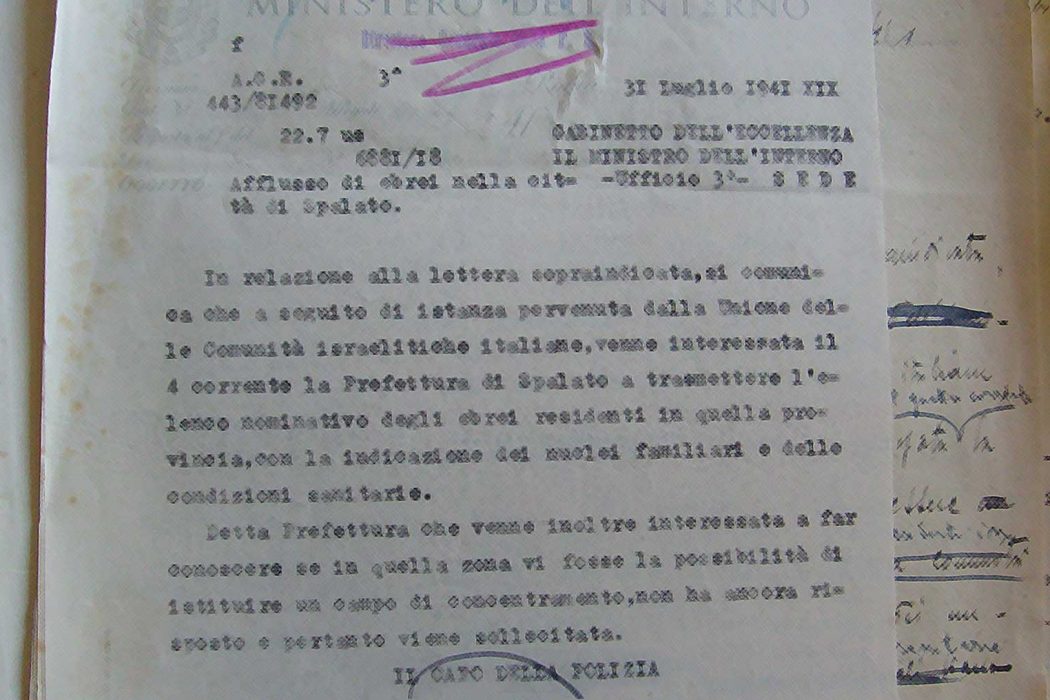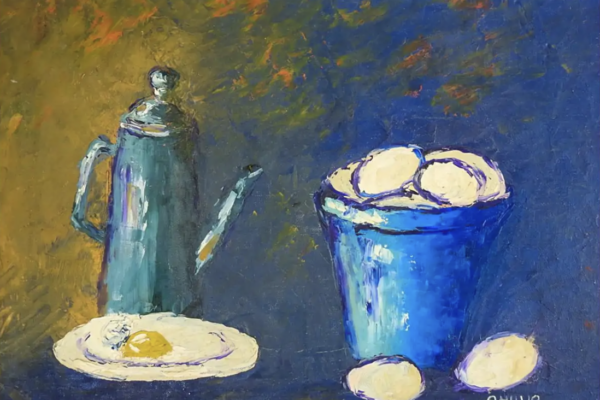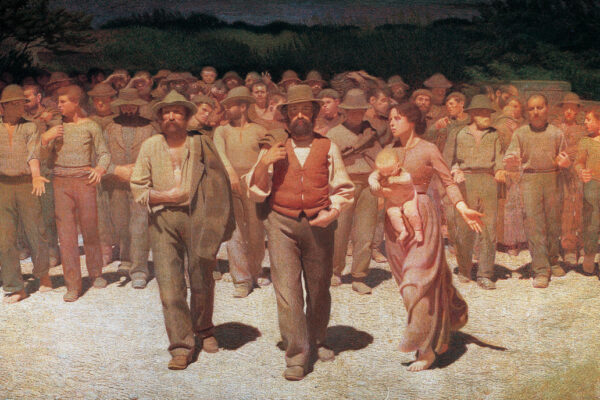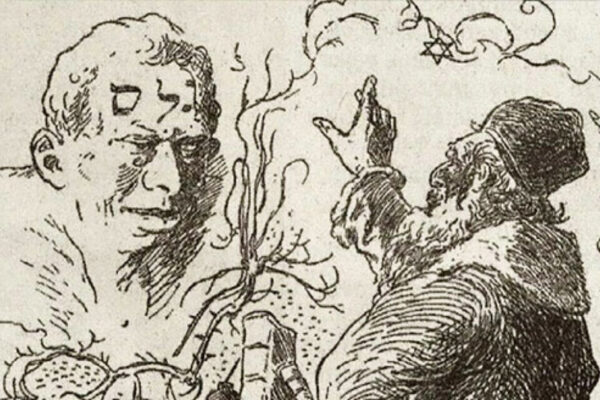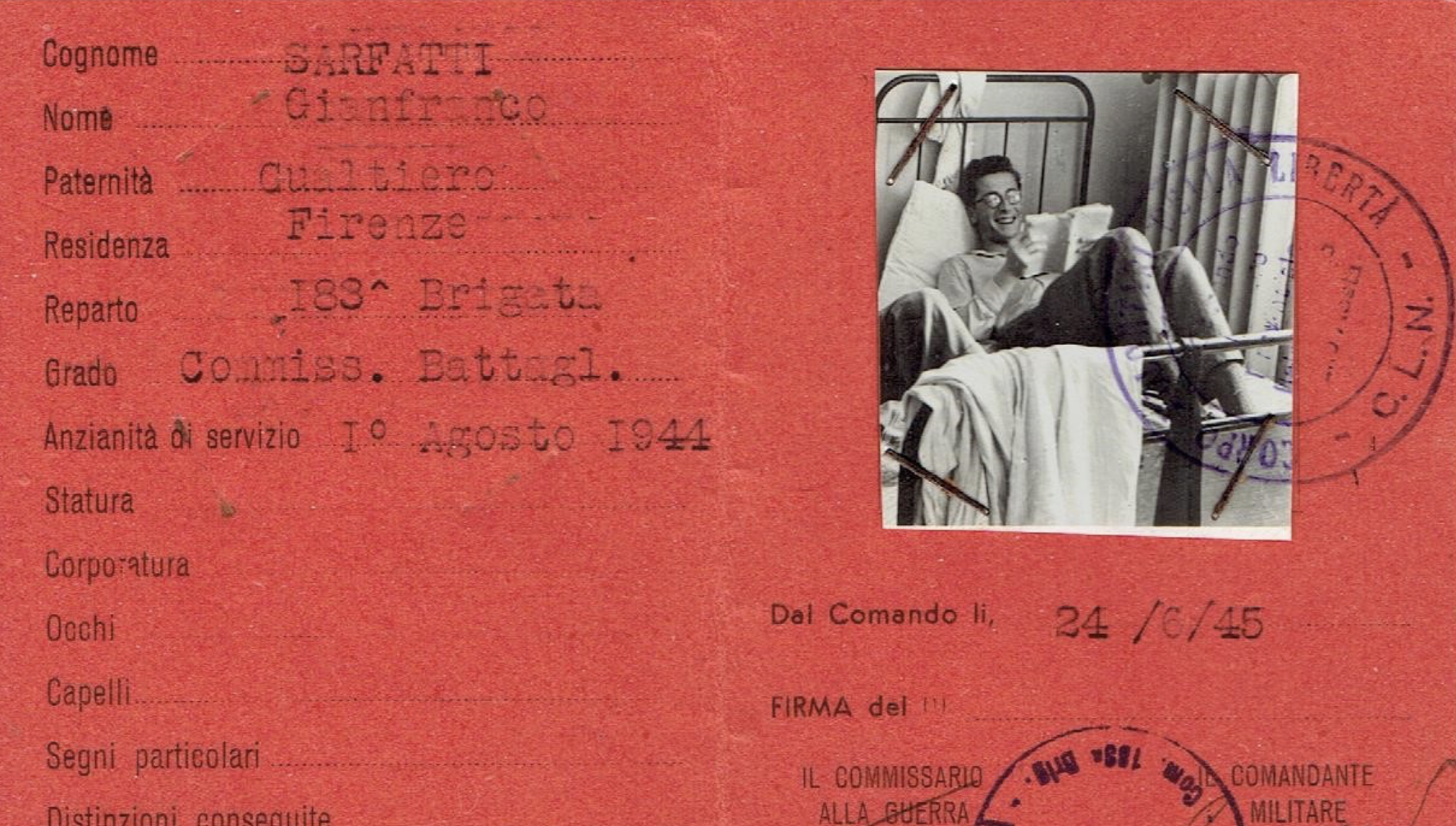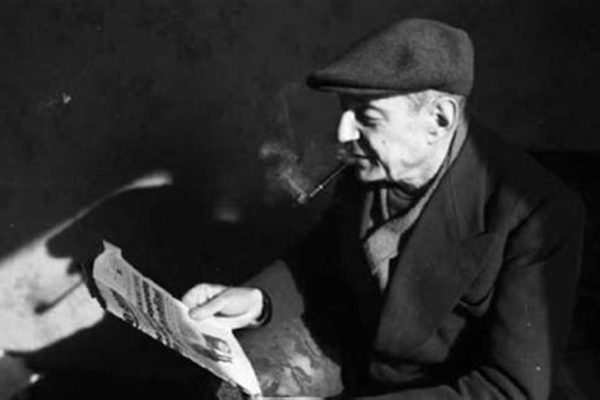“My humble request to Your Excellency”. Brief accounts of life and death in Italy. Based on archival documentation on “foreign Jews” interned by the Fascist Regime.
In 1938 the Racial Laws stripped of their Italian citizenship Jews who had acquired it after 1919 and ordered all “foreign” and “stateless” Jews to leave the country by March 12, 1939. Approximately 9,000 Jews managed to leave with the assistance of Delasem and the Joint Distribution Committee. Another 4,000 had no means and place to go and remained in Italy in a precarious situation. When Italy entered the war in 1940, Mussolini ordered the immediate arrest of all foreign Jews who had remained in the country.
The wave of arrests was brutal and lead to a substantial expansion of Italy’s already significant civilian internment system with the establishment of concentration camps and internment locations for Jews.
During the course of the war, some 6,000 Jews— coming from war territories through military deportation or as refugees who managed to pass the tightly controlled Italian border— were interned.
By the end of the war roughly 10,000 Jews were interned in Italian concentration camps and confinement locations. Of the approximately 7,000 who found themselves in the Italian Social Republic, 2,400 were deported to death camps. The others emigrated for the most part to the US and some to Palestine.
Rabbi Otto Deutsch
June 30 1941 – After Italy’s invasion of Yugoslavia, the Chief of Police of Fiume requested information concerning a group of Jews residing in Susak including Rabbi Otto Deutsch. He wanted to know, in particular, whether measures should be taken against the “above mentioned Jew”.
The Susak police responded that Rabbi Deutsch had no political record. Three days later, the same office sends a second letter: “The above mentioned Jews is known as an anglofile, anti-Italian and antifascist. We recommend that he be interned in a concentration camp”.
On August 28 Rabbi Deutsch was arrested for “having attracted the attention of the police due to his activity with Jewish refugees from Croatia”.
September 1, 1941 – the Municipal Prison of Trieste. Rabbi Deutsch to the Police of Fiume and the Ministry of the Interior: “As delegate of the Jewish relief agency Delasem, I have been assisting refugees of the Jewish race from Croatia. This is a merely charitable activity and it should be noted that I am a rabbi. I plead to be freed and to be able to return to Susak”.
September 15, 1941 – Commissioner Palatucci on behalf of the Fiume Chief of Police to the Ministry of the Interior: “the above mentioned Jew represents a serious danger for national security”.
September 22, 1941, Concentration camp of Ferramonti. Rabbi Otto Deutsch to the Ministry of the Interior. “I was authorized by the police of Susak to compile requests of admission on behalf of refugees from Croatia who were fleeing to save their lives. I compiled the requests on their behalf and sent them to the police of Susak. For this reason I was arrested. “
A few days later, in another letter Fiume Commissioner Palatucci wrote again: “Otto Deutsch has been arrested due to political reasons not to his charitable activity”.
Hank Gelb, witness on war crime trials in 1945: “Rabbi Eliasar Otto Deutsch’s life was marked by a merciless treatment by the Fiume Chief of Police, Genovese. The Rabbi distributed funds from American Jewish organizations to Jewish refugees from Croatia. He sought the authorization of Chief of Police Genovese who approved his activity. He ordered Rabbi Deutsch to maintain a list of the Jewish refugees in Susak so that they could be sent to various locations in Italy. Rabbi Deutsch believed Genovese’s reassuring words and delivered to him the list of refugees. Shortly after all refugees were arrested and turned to the Ustashi police. After this, Genovese had Rabbi Deutsch arrested and deported to the camp of Ferramonti.”
In September 1943, from Ferramonti Rabbi Deutsch was sent to the mental hospital of Nocera Inferiore. He was not the only Jew arrested for political reasons to be transferred to a mental hospital. Rabbi Deutsch died at the Nocera hospital a few weeks later. He was 32.
His wife and son survived in hiding. After the war, they tried to find out what had happened to their loved one. They were never even given information on his burial place. Decades later, Rabbi Deutsch’s granddaughter learned that he had been buried in the hospital’s cemetery. She was told however that, in 1972, his remains had been exhumed. The municipality of Nocera and the Church have refused to provide any further information.
Artur Amsterdam
Artur Amsterdam son of Josef David and Richter Jalka, was born in Offenbach, Germany on March 27th, 1921. He was interned in Alberobello, Bari, on July 28th, 1940; then in Fermignano on December 24th 1941, where he was reported still present on September 27, 1943.
July 1944, Artur Amsterdam to the Honorable Prison Administrator of Urbino. The undersigned, Arturo Amsterdam, son of Josef David, interned and detained in the prisons of Urbino humbly submits the following request.
Following my last request addressed to this Honorable Office in which I asked for my release due to health reasons, I was ordered to take a medical examination. The doctor in charge recommended a radiological examination. This visit was to be performed on Saturday the 29th, but for technical reasons could not take place. Given the circumstances, it is unlikely that it will take place in the future, and for this reason today the undersigned dares to turn once more to your Office. I plead with you to keep in mind the state of my health which is constantly worsening and allow me to return to Fermigliano and to my family, where I can get the care I need. Trusting in the favorable reception of this application, the undersigned would like to thank you in advance. With perfect esteem, Artur Amsterdam
A note was added on the back of this letter: “Taken from the German gendarmerie and transported to Forlì”.
Artur Amsterdam was killed in Italy, together with his mother and sister Selma in the massacre that took place at the aviation field in Forlì on September 5, 1944.
Samuel Dames
Originally from Poland, Samuel Dames, in Italy had become a “stateless Jew”. His wife, Giovanna Rogozinski was a German citizen who had become Polish by marriage. They were part of a group that left from Trieste in an attempt to reach Palestine, but remained blocked in Benghazi. They were arrested, transferred to Naples, and from there, interned at Ferramonti. The Dames were transferred to Caprino Veronese, in the province of Verona on November 11, 1941.
September 11, 1940 – The Ministry of the Interior to the Prefect of Naples, the Prefect of Cosenza, the Director of the concentration camp at Ferramonti.
Please dispose that, with the exception of Irene Weiss daughter of Ermanno and Meta Kanner, included in the list No. 281 and No. 301 attached to this report, all other 300 foreign Jews held in those prisons be transferred to the concentration camp at Ferramonti whose Director is in charge of their internment. [ … ]
August 28, 1941 – The Ministry of Interior to the The Prefectures of Cosenza and Verona, the Director of the Concentration Camp at Ferramonti di Tarsia.
Please provide that the internee [Samuel Dames son of Israel] be transferred from the concentration camp at Ferramonti to a town in the province of Verona, with a mandatory expulsion paper, together with his wife, Giovanna Rogozinski, daughter of Solomon. The aforementioned Samuel Dames, if indigent, must be granted housing allowance of lire 50 per month, and eight liras per day for food, while his wife must receive a subsidy 4 liras per day.
November 6, 1941 – From the Director of the concentration camp at Ferramonti to the Prefecture of Verona, the Ministry of Interior and the Prefecture of Cosenza (…)
Tonight, the interned Jews Samuel Dames son of Israel and Giovanna Rogozinski, daughter of Salomon, bearing mandatory expulsion papers, are being transferred to this Police Headquarters which they will reach within three days. The aforementioned have received subsidies until their departure day. Please notify upon their arrival. The Director of the camp.
November 7, 1941 – The Prefecture of Verona to the Ministry of Interior and the Prefecture of Cosenza [ … ]
With reference to the above Ministry’s notification, we inform you that the stateless Jews in question, traveling from the concentration camp at Ferramonti have arrived here yesterday, and have been interned in Caprino Veronese, where they were sent mandatory expulsion papers. The Prefect.
Samuel and Giovanna Dames were arrested on 11 March 1944 along with 17 other foreign Jews. Transported in Fossoli, they were deported to Auschwitz on April 5th, 1944.
Berta Ashkenasy
Berta Ashkenasy was born in Fiume on February 23, 1940, to Lazar Ashkenasy and Elena Berger Ashkenasy. On 11 June 1940 Lazar Ashkenasy was arrested and interned in Ferramonti. Elena Berger Ashkenasy was summoned to the Police headquarter of Fiume, where she learned that she would be interned as a “foreign Jew”.
Their daughter, Berta Breindel, was three and half months old. Elena’s youngest sister Rosina Berger, 15, also lived with the family. A few weeks after the summons, Elena and Berta were arrested and transported to the internment location of Caprarola near Viterbo.
October 10, 1940 – The Hospital at Viterbo to the Police of Fiume. This is to inform you that we have admitted to this hospital Berta Ashkenasy, infant daughter of Elena Berger. She suffers from phlegmatic tonsillitis.
February 24, 1941 – Elena Berger Ashkenasy to the Viterbo Police. My child is 11 months old. She is frail, cannot receive the necessary care. Please accept my humble request to transfer my husband from Ferramonti.
February 27, 1941 – Elena Berger Ashkenasy to the Ministry of the Interior. I, the undersigned Elena Berger Ashkenasy, […] have received notification that by order of the Ministry of the Interior I must be transferred to the concentration camp of Ferramonti. With tears in my eyes, a mother in despair, I humbly request that this Ministry may reconsider my miserable case.
March 22, 1941 – Rosina Berger to the Police of Fiume. My sister, Elena Berger Ashkenasy is interned in Caprarola with her 12 month old daughter. In need of care. Often ill with fever. She has presented a request to have her husband transferred. But she was notified that she and the child would be transferred to Ferramonti instead. They are in no condition to endure the journey nor the climate in the malaria-ridden region of Ferramonti.
April 9, 1941 – The Ministry of the Interior to the Police of Viterbo and Cosenza. Please make arrangements for the transfer of Lazzaro Ashkenasy from Ferramonti to Caprarola where his wife is interned.
July 8, 1942 – The Viterbo Police to Ministry of the Interior. On June 6th the above-mentioned internee has given birth to a child and named him Ernesto.
February 23, 1943 – Police journal. Lazar Ashkenazy, a Jew, born in Poland must be immediately re-transferred to the concentration camp of Ferramonti di Tarsia.
March 10, 1943 – Police journal. In reference to her verbal request to the Chief of Police, notify Ms. Berger Aschkenasy that it will not be possible to allow her husband to leave Ferramonti.
March 16, 1943 – Elena Berger Ashkenasy to the Police of Fiume. I beg you pardon, Mr. Chief of Police, if I dare appealing to your generosity in the hope that you will consider my desperate situation.
August 25, 1943 – Elena Berger Ashkenasy to the Police of Fiume. I, Elena Berger Aschkenasy, take the liberty to call your Excellency’s attention to the following: My husband was arrested on June 19, 1940 and, after one month in prison, he was interned in the concentration camp of Ferramonti. A few days later, the same fate came to me. We had a store, that afforded us a modest existence. But we had to sell it and we found ourselves destitute. I am ill and so is my four-year old daughter. My son is 19th months. My daughter suffers from heart disease. Medicines require a great amount of money that I don’t have and her health declines day after day. I beg your Excellency to allow my husband to be with me.
October 1, 1943 – The Police of Fiume to the Ministry of the Interior. Given the current situation we reject this request.
Berta (Breindel) Ashkenasy died of pneumonia on unknown date. She was between 4 and 5. She was buried in the Jewish cemetery of Rome on November 5th, 1946.
While hiding under false identity, Rosina Berger was arrested in Trieste, recognized by the Police of Fiume and deported to Auschwitz. A family friend said that she had been shot on the ramp upon arrival. She was 17.
When the Police in Fiume arrested and consigned to the German authorities her brother and sister, Elena decided to take to the mountains with her son Ernesto. They fled to Switzerland without a guide.
Turteltaubs and Triebenfenders Families
Nathan Triebenfeld and his wife Hanna Lauterstein, were German Jews. Edmund Turteltaub, an Austrian Jew, resided in Milan with his wife Gertrude Popper and his sons Walter and Gianni.
The Turteltaubs and Triebenfenders were part of a group of 302 Jewish refugees from various European countries (Austria, Germany, Czechoslovakia) who attempted to reach Palestine in the spring of 1940. Their trip was interrupted in Benghazi, Libya following Italy’s entry into the war. They were shipped back to Naples, held in prison and subsequently interned in Ferramonti. Many of them, were transferred to internment locations in central and northern Italy.
Edmund Turteltaub, son of Max, was born in Vienna on October 4, 1899. Interned at Campagna, Salerno on July 6th,1940, then at Isola del Gran Sasso, Teramo on July 27th, 1940. Transferred to the camp at Ferramonti di Tarsia on January 10th 1941. From there, to Arcidosso the on October 7th,1941 and to Scipione di Salsomaggiore Perugia on June 7th 1944.
Gertrude Leo Popper, was born in Kundenburg on April 1, 1904. She was interned at Ferramonti on February 20th,1941; Arcidosso on October 7th, 1941 then in Scipione di Salsomaggiore from June 7th,1944 .
Gianni Turteltaub, son of Edmund, was born in Innsbruck on March 16th,1932. Interned at Ferramonti on February 20th,1941; transferred to Arcidosso on October 7th, 1941 then to Scipione di Salsomaggiore from June 7th,1944 .
Gualtiero Turteltaub son of Edmund, was born in the Dornburg March 24th,1935. Interned at Ferramonti on February 20th,1941; transferred to Arcidosso on October 7th, 1941 then to Scipione di Salsomaggiore from June 7th,1944 .
Nathan Triebenfeder son of Wolf, was born in Stanislau on October 1, 1889. Interned at Ferramonti on September 16th,1940, then in Arcidosso on October 9th, 1941 and transferred to Fossoli on April 17th 1944.
Hanna Lauterstein, daughter of Schaje, was born in Stanislavczyk on December 28th,1888. She was interned in Ferramonti on September 16th,1940. Transferred from Ferramonti to Arcidosso on October 9th, 1941 and to Fossoli on April 17th. 1944.
October 17, 1941, Arcidosso – Dear Signor Dottore Astorre Lusana – Livorno, Piazza Banamozagli 7. We take the liberty to submit our courteous request to you for a certain sum, based on the following.
Since July 1940 we have been interned in the Camp of Ferramonti (Cosenza) jointly with our families. From the 7th of the current month we were sent to the internment location at Arcidosso, in the province of Grosseto. Unfortunately, our wives, who at the internment camp received a subsidy of 8 liras per day, here receive only 4 liras per day. Further, as we are headed toward winter season and it’s already getting so cold that we can not bear it, being accustomed to the warm climate of Calabria. We are lacking wood to heat the stove. Since we are without means, and not allowed to work, we can not obtain clothes, shoes and wood for the winter. Especially the children and the women are in desperate need of shoes, as we await with anxiety for the summer.
Our consciousness holds us to address you, dear Signor Dottore, appealing to your good heart, in addressing again our prayer for help. We have the faith in your patience and goodness, and greet you with the utmost respect and best wishes. The families of Engineer Edmund Turteltaub and Nathan Triebfeder.
After their arrest order of November 30, 1943 issued by the Italian police, the Triebenfelds and Turteltaubs were interned in the camp of Roccatederighi and from there, through various routes, transported to Fossoli. From Fossoli, they were all deported to Auschwitz.
Gabriella Kazar
Gabriella Kazar, daughter of Joseph Kazar was born in Budapest, in 1913. She married Enrico Levi, and was interned in San Donato Val Comino (Frosinone).
October 5, 1940, the Vatican – The Secretariat of State of His Holiness to His Excellency Rev. Monsignor Michele Fontevecchia Bishop of Aquino, and Pontecorvo, and Sora.
Ms. Gabriella Kazar Levi, a non-Aryan currently interned in San Donato Val Comino, on September 21 has turned to this Secretary of State as to obtain, with the support of the Holy See, an emigration visa to Brazil. The request, unfortunately, can not be granted because from the documents it does not appear that the supplicant has converted to Catholicism. The Brazilian government, indeed, has irrevocably stated that the visa in question can only be issued to non-Aryans who can document that they have received baptism prior to 1935 and are presented as truly good Catholics. Therefore, I ask Your Excellency to please to bring the above decision to the attention of the internee in the way you will deem best. Grateful for your kind offices, I take this occasion to state once more my feelings of sincere esteem. Your Excellency the Most Reverend Servant Cardinal Maglione
July 7, 1941, San Donato Val Comino, – Gabriella Kazar to the Illustrious Head of Police of Frosinone. I, the undersigned Kazar Gabriella, a Jewish woman, interned in this municipality of San Donato Val Comino, expose to Your Illustrious Excellency the following. Some time ago I appealed to the Honorable Ministry of the Interior for permission for my husband, Enrico Levi, interned in the concentration camp Ferramonti di Tarsia, to join me in this municipality of San Donato. It was not possible to have my request fulfilled, instead I was given the opportunity to join my husband in the Camp of Ferramonti. However the health conditions of my young son, who is here with me, did not allow me to do that. Now, in learning that in turn my husband is not in good health, it would be my burning desire to ascertain in person about his health. I thus hereby pray to the benevolence of Your Illustrious Excellency to grant me a few weeks of leave, in order to travel to Ferramonti di Tarsia. I want to make clear that I would leave my son in the custody of the people I trust, in this municipality. Other women internees, in situations similar to mine, have obtained the requested permission along with travel documents. Confident that my request will be kindly accepted, I advance warmest thanks, and with much compliance, my respect. Devoutly yours, Gabriella Kazar.
Gabriella Kazar and her child had converted while interned in Italy. Cardinal Maglione’s justification did not reflect the full truth about Brazil’s policies which in fact, did not pose requirements on religion or conversion. While Gabriella Lazar was denied a way out of Europe, the Brazilian Consulate in Naples was issuing visas to German Jewish refugees.
After the armistice, Gabriella and her child were arrested in San Donato Val Comino and deported to Auschwitz.
Herman Riesenfeld
Herman (Ermanno) Riesenfeld, an Austrian Jew, lived with his wife Marta Loewy in Trento. In the summer of 1949 they were interned in two different towns in Abruzzo. Form there they obtained to be transferred to Moena (near Trento) to assist a sickly relative.
Herman (Ermanno) Riesenfeld was interned in Moena (Trento). He addressed the following letter on 12 January 1942 to Chief Rabbi Ermanno Friedenthal of the Jewish Community of Verona. It was forwarded to police headquarters in Trento, to the Prefectural Commissioner of the town of Moena on January 26th, 1942, as document number 338, for their information and cognizance.
January 12, 1942, Moena – Hermann Riesenfeld to the Much Revered Chief Rabbi E. Ermanno Friedenthal. Via Portici 3, Verona.
Esteemed Chief Rabbi: I hereby confirm receipt of your valued letter of the 7th of the current month as well as of the 100 lire you had the goodness to send me. Allow me Estemed Chief Rabbi, to thank you warmly for this donation. Your belief that we will now certainly receive a subsidy from the State, unfortunately is not correct. I explicitly affirm that neither I, nor my wife, nor my brother in law and his wife, receive any subsidies and that, therefore, we are forced to live exclusively on the charity we receive from you. […] Please, Estimable Chief Rabbi, do not deprive us of regular monthly aid – such as you have granted us so far – since such an action would lead us to a disastrous situation. […]
Regarding the matter of the shipment of clothing by DELASEM, I dare point out to you the bare essential needs for us (4 persons) which would be:
1 mens’ winter coat – length 115, chest 195;
1 ladies’ winter jacket – length 120, chest 115;
1 woman’s cloak for winter – length 120, chest 100;
1 skirt – length 54 width 50;
1 full dress for the ladies;
winter pants 105, 75.98, 105;
jacket (chest) length 75;
1 pair of ladies’ shoes size 40;
1 pair of ladies’ shoes 41;
1 pair of ladies’ shoes 43,
as well as a bit of linen for the winter,
and socks.
I would be most grateful if you would have the goodness to provide this clothing be sent to us as quickly as possible – because here it’s very cold and therefore we suffer a lot. Thank you in advance. We are grateful, Signor Chief Rabbi for your kindness.
On January 4, 1944, Hermann and Marta Riesenfeld were arrested and transferred first to Trento, and then to the concentration camp at Fossoli. From there they were deported to an unknown location, and never returned.
Guglielmo Lausch
Guglielmo Lausch and his family entered Italy in 1941. They were interned in a small town in Piedmont under condition that they would remain in Italy “at their own expenses”.
April 7, 1942, Caluso – Petition by Guglielmo (Wilim) Lausch to the Ministry of Interior. The undersigned Guglielmo Lausch, son of Hermann, interned from Dalmatia to Caluso, asks to Your Ministry concession to move, with his family, from Caluso to Asolo (Treviso). His family is composed as follows: wife: Slava Hirschl daughter of Ignazio; daughters: Olga Lausch Fisher and Nada Lausch Selan; nephew: Branko Selan, son of Rodolfo.
The reason for our request to keep the family together derives from the fact that we all used to live together in Split. A part of our family —my daughter Zdenka with her husband, then her mother and sisters of my wife were forced to leave Split before us and interned in in Asolo (Treviso). As we have always lived together and we need to live together, both from material needs and because of our family history. Waiting for a favorable response, I sign with perfect observance Lausch Vilim (William) April 19, 1942.
The Prefect of Treviso to the Ministry of Interior and the Prefecture of Aosta [ … ] I forward the request of the aforementioned Jews [Guglielmo Lausch, Slava Hirschl] interned in Caluso, informing that since they are not related to the Jew Eugenia Scharz, interned in Asolo and given the large number of internees in that location, I recommend not to grant the requested transfer.
March 24, 1943 – The Ministry of the Interior to the Prefecture of Aosta. Taking into account what has been reported [ … ] on January 29 by the Prefect of Aosta, nothing precludes the aforesaid individual [Selan Rodolfo, Aryan Catholic] from being allowed to be transferred to Caluso to live with his wife Nada Lausch, daughter of Guglielmo, as we do not deem advisable to exonerate the latter from internment.
After the armistice, Guglielmo Lausch, his wife Slava and his daughter Olga were denounced and deported to Auschwitz along with 18 of 22 Jews interned in Caluso.
Nada Lausch Selan escaped with her husband Rodolfo and their son Branko.
Manfred Buchaster
Manfred Buchaster, the son of Jakob Buchaster and Paula Falek, was born in Leipzig on September 13th, 1938.
For Jews in Nazi Germany, in September 1938, the decision to have a child required courage and boundless determination. The year after Manfred’s birth, the Buchaster extended family —who owned a textile trading company— scattered in different directions in an attempt to reach Palestine.
Jakob Buchaster, the youngest of ten siblings, with his wife, son and elderly parents, tried the escape route through Italy. After a year in Milan and an unsuccessful attempt to secure ship travel to Palestine, they were interned in the camp of Ferramonti di Tarsia, in Calabria.
On October 15, 1941, the family was transferred to Costa di Rovigo, in Veneto, under the system of surveilled confinement (forced residency in small, non strategic towns). They resided in a house in the center of town. Manfred, whom everyone called Manni, learned to speak Italian and played with the local children.
On December 3rd, 1943, the Buchaster family was arrested and imprisoned. The director of the prison did not want Manfred —a five year old child— to live inside the jail. Therefore Jakob and Paula entrusted Manni’s custody to their neighbors, Piero e Teresa Giuriola.
On June 24th, 1944, Jakob and Paula were transported to the transit camp of Fossoli (Modena) and on the 26th, deported to Auschwitz. Jakob died there. Paula survived.
At the end of July 1944, SS officers went straight to the Giuriolas’ home and after beating Teresa, took Manni away. From that moment on, Manfred Buchaster, age 6, the child everyone called Mani, was never seen again.
Despite his mother’s desperate search after the war, nothing was ever learned about Manfred Buchaster’s fate.
Moisè Abraham Saltiel
Moisè Abraham Saltiel was born in Thessaloniki, Greece on September 15th 1873. Before their internment, Moisè, his wife Olga Molho and their son Alberto, lived in Milan.
Father and son were interned in the province of Pistoia in 1940, first in the town of Larciano on July 16th and then in Agliana on November 5th. There they were joined by Olga in 1942. Transferred back to Larciano on June 16th, 1942, they returned once again to Agliana on March 28th 1943, were Moisè was still interned on November 22, 1943, after the arrival of the Germans in Tuscany.
Olga Molho daughter of David Molho, was born in Thessaloniki on August 1st, 1885. She was interned at Agliana from April 4th, 1944.
Petition for assistance sent in copy to Delasem. In the hope of their endorsement *)
June 1942, Larciano (Pistoia), – To the Ministry of the Interior, General Directorate for Public Security, Foreign Office, to the person in charge of Greek civilian internees. Rome.
The undersigned, Moise Saltiel and son Alberto Saltiel, Greek citizens. Away from their home in Milan for the past fourteen months due to internment in the municipality of Larciano, Pistoia, the undersigned take the liberty to respectfully insist that their appeal of November 10th be conscientiously reviewed and examined, and ask that if it is not possible at this stage to grant them freedom.
That Moise’s age (70) may be taken into consideration so that least a short leave be granted to them in order to go to Milan to visit their respective wife and mother, and temporarily settle their outstanding interests. In paying homage, they thank you
Moise Saltiel, Alberto Saltiel.
April 20th 1942, Milan – To his excellence the Minister of the Interior, Rome.
The undersigned, a Greek citizen residing in the Kingdom of Italy since November 1919, writes on behalf of her husband Saltiel Moise, age 70, and his son, Alfredo Alberto Saltiel, age 26, interned in the municipality of Agliana, Pistoia. Saltiel, underwent two prostate operations during the first war. He suffers from pneumonia. Alfredo is also unhealthy, ill with bronchitis. I have no resources and live in poverty being seriously ill, as shown by the enclosed medical certificates. I am in need of care, unable to hire help and not qualified to obtain hospital care. For these reasons I dare to ask Your Excellency to allow my son, currently unemployed not by his own will, to return to work and to attend his ailing mother. With anxiety but with confidence, I wait my request to be fulfilled, with reverence, I thank you in advance. Olga Saltiel, age 66.
26 February 1943, Agliana (Pistoia). To the Ministry of Interior, General Directorate for National Security, The Foreign Office, responsible for civilian internees to Greek War. Rome.
I hear that, after the last bombing raid on the city of Milan, the windows of my apartment in via C. Menotti No.16 were shattered. It is urgent, therefore, that this Ministry grants me permission to go to Milan for fifteen days. Gratefully. Alberto Saltiel.
Moisè and Olga Saltiel’s pleading remained unanswered. They were arrested in Florence on February 21st, 1944, and taken to Fossoli. Alberto went into hiding, and survived. From Fossoli the Saltiels were deported to Auschwitz on February 26th 1944.
Olga Weiss
Olga Weiss, the daughter of Solomon Baum, was born on January 1, 1890 in Vukovar, Yugoslavia. She was interned in Pollenza, Macerata on October 11th, 1942; transferred from Sforzacosta to Pollenza on November 24th 1943 where she was last accounted for on February 18, 1944.
Before their internment, Olga Weiss, her second husband, and her son, Ernesto Kon, lived in Susak. The territory surrounding the city had been annexed to the Carnaro Province after the partition of Croatia, following the Italian invasion of Yugoslavia in April 1941. The male family members were interned in the island of Ustica, suggesting that they were targeted for both racial and political reasons.
December 21, 1942, Scipione di Salsomaggiore – To the Honorable Ministry of the Interior in Rome. Petition for help sent in copy to Delasem.
Ernesto Kon residing in Sussa (Fiume) Via Bruno Caleari 22, pleads to be reunited with his parents under the status of surveilled confinement. My mother, Olga Weiss, born Baum, is interned in the concentration camp at Pollenza (Macerata) and in poor health. My step-father, Samuel Weiss, is detained in the concentration camp of Ustica (Palermo). He is 68 years old and, too, needs care.
February 2, 1943, Pollenza – To the Honorable Ministry of Interior. Rome.
The undersigned, Olga Baum nee Weiss, born January 1, 1890 in Vukovar (former Yugoslavia) of Solomon Baum, of Jewish race and faith, interned since November 23, 1942 in the concentration camp at Pollenza (Macerata) proffers to this Honorable Ministry the following request. She and her husband, Samuel Weiss, born January 9, 1877 in Dubrovnick (Yugoslavia) also of the Jewish race and faith, a resident for 48 years at Sussa, has been held since November 23 on the island of Ustica (Palermo Province). They were arrested in Sussa and were told by local authorities that they could live together in confinement under surveillance. Arriving in Fiume, they were separated, the husband, after a few days in jail, was sent to Ustica, the undersigned was sent to Pollenza, where she is currently interned. The aforementioned suffered two serious surgeries not long ago. His health is weak and needs care not available in the concentration camp. Because her husband suffers from nervous breakdown and hernia, the undersigned allows herself to request this Honorable Ministry a transfer to a confinement location. The son of the undersigned’s first marriage, Ernesto Kon, son of Joseph Kon, born in Vuideovice (Yugoslavia) October 9, 1912, of the Jewish race and faith, interned in the concentration camp of Salsomaggiore Scipione, has also submitted a request to this Honorable Ministry to be transferred to a confinement location and be reunited with his parents. Hoping that this Honorable Ministry will grant the requested transfer and nominate a place where all the three family members could live together and mutually lighten their fate, the undersigned thanks in anticipation of your response and pays her respects with compliance. Olga Baum Weiss
Olga was arrested in Pollenza (Macerata) in February 1944. Conducted to Fossoli, she was deported to Auschwitz on April 5, 1944.
Oscar Roger
Oscar Roger, a professor of history of the German nationality, was living in Ljubljana in 1941 with his wife Berta and her relatives. When, on April 6, 1941 Yugoslavia was occupied by the Axis, the city and the surrounding territory were assigned to Italy. In July 1941 the Jews who were living there were interned in Italy. Oscar was sent to Ferramonti di Tarsia, in Calabria, but later managed to join a cousin who had been interned in the province of Rovigo.
Oscar Roger and his wife appealed insistently to the Italian authorities, first in an attempt to allow Roger to visit his wife and mother-in-law in Lujbljana, and later to have the two women join him in his internment in Sienta, near Rovigo.
July 20, 1942, Ferramonti – Roger Oscar to the Ministry of the Interior. The undersigned, Roger Oscar son of Ferdinando, interned for a year in the concentration camp at Ferramonti di Tarsia, is hereby appealing to this Honorable Ministry as follows. My wife Berta Roger, and her 74 year old mother are presently residing in Ljubljana, in Resiljeva Street No. 4. The petitioner, who has been married for 30 years, and has not seen his loved ones in the last five years prays this Honorable Ministry, to grant him a short license in order to be able to go to Ljubljana to visit his family, settle his business and safeguard his assets. In addition, he has learned that his old mother is sick and therefore has a keen desire to see her again. His wife is in poor health as well and the undersigned would like to be helpful to her. Confident in the reliable understanding of Your Honorable Ministry, hoping for a benevolent outcome of this petition, I sign with maximum compliance. Roger Oscar
September 11, 1942 – The High Commissioner of Ljubljana to the Ministry of Interior. The Prefecture of Cosenza hereby advises that following our inquiry, it appears that neither the mother-in-law, nor the mother of the petitioning inmate are sick. This being so, also in view of the particular situation in the province, we express our opposition to granting of the requested visiting license.
Oscar’s wife and mother-in-law, who had remained in Ljubljana, managed to enter Italy and to join Oscar in the days following the armistice of September 8, when the province of Rovigo was already occupied by the Germans. The three remained hidden for some time until their arrest on December 6,1943. Oscar and Bertha were transferred to Fossoli March 31, 1944 and deported to Auschwitz on June 6, 1944.
Sigfried Richter
Sigfried Richter, the son of Lazzaro Richter and Rosalia Sink, was born in Vienna in 1898. He married Jolanda Brauer, born in Sopron, Hungary, in 1905, the daughter of Maurizio Brauer and Lina Neumann. In 1940, they were arrested and interned in Castenuovo Garfagnana.
August 15, 1943 – The Union of the Italian jewish Communities, Delasem, Rome. To the Honorable Ministry of Interior. Police Headquarters. Internees office. In confirmation and clarification of what Sigfried Richter has pleaded in his appeal submitted on July 19, we urge this Honorable Ministry to take notice that the paperwork and permissions regarding the emigration of Mr. and Mrs. Richter are almost completed. Having obtained visas to emigrate overseas, in order to implement the emigration of the Richters, all that is needed are the exit permits. They will depart from one of the airports in Rome headed to Spain where they will embark for South America. We are confident that this Honorable Ministry will take this case in favorable consideration and authorize their travel as we suggested, as to allow us to let the Richters depart as soon as possible. With gratitude for the interest that this Honorable Ministry will grant, we send best regards.
The Ministry of the Interior did not grant any of the permissions requested. Shortly after, Sigfried Richter and Jolanda Brauer Richter were arrested and deported to Auschwitz.
Lazarus Werczler
Lazarus Werczler, a Hungarian Jew whose family had been living in Fiume since 1898, was arrested and interned in the camp of Urbania in the fall of 1941.
June 10, 1942, Urbania (Pesaro) – Lazarus Werczler to the Police of Fiume. The undersigned Lazarus Werczler, son of Simone and Giovanna Konigstein, born in Cziko, Hungary on July 3rd, 1891, currently interned in Urbania, states the following: As a result of my direct request to your respected Police Headquarters, I was granted that my wife, Margherita Werczler, daughter of Adolfo Walter and of the late Francesca Werczler, born in Cziko on September 18th, 1891, residing in Fiume, via Mario Agheben 18, may come to Urbania to live with me for eight days. While thanking you for what was granted me, please provide my wife Margherita Walter Werczler with a travel permit, so that it, with her own means, she may be reunited legally with me. I plead with your courteous solicitude in this matter, as my wife is wanting to start the trip at the earliest date possible. With deference, I offer devout appreciation.
December 6, 1943 – The Police of Pesaro solicit from the Police of Fiume information about Lazarus Werczel initiating an investigation process.
February 18, 1943. The Police of Fiume to the Police of Pesaro. Please stop searches for the Jew Lazarus Werczler as he has been arrested and is in the hands of the German police. The motivations of the arrest are not known.
Lazarus Werczel had managed to escape from Urbania and take refuge with friends who gave him shelter. He later managed to reach Fiume where his wife and sons had remained. That were arrested with the help of the Police of Fiume, taken to the concentration camp of San Sabba in Trieste and, from there, deported to Auschwitz.


